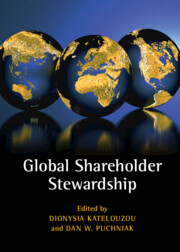Book contents
- Endorsements
- Global Shareholder Stewardship
- Global Shareholder Stewardship
- Copyright page
- Dedication
- Contents
- Figures
- Tables
- Contributors
- Foreword
- Acknowledgements
- Abbreviations
- Part I Foundations
- Part II Jurisdictions
- 4 Shareholder Stewardship in the Netherlands
- 5 Capitalist Stakeholders
- 6 Institutional Investor Stewardship in Italian Corporate Governance
- 7 The Danish Stewardship Code
- 8 Stewardship Norwegian-Style
- 9 Stewardship and Shareholder Engagement in Germany
- 10 The Japanese Stewardship Code
- 11 Korea’s Stewardship Code and the Rise of Shareholder Activism
- 12 The Assessment of Taiwan’s Shareholder Stewardship Codes
- 13 Stewardship in the Hong Kong International Financial Centre
- 14 Singapore’s Embrace of Shareholder Stewardship
- 15 Institutional Investor Stewardship in Malaysia
- 16 The Thai Institutional Investors Stewardship Code and Its Implementation
- 17 Shareholder Stewardship in India
- 18 Institutional Investors in China
- 19 Stewardship and Collective Action
- 20 Stewardship Principles in Canada
- 21 The Uncertain Stewardship Potential of Index Funds
- 22 Encouraging Sustainable Investment in South Africa
- 23 Stewardship in Kenya
- 24 The Brazilian Stewardship Framework
- Part III Comparisons
- Index
15 - Institutional Investor Stewardship in Malaysia
Code, Context and Challenges
from Part II - Jurisdictions
Published online by Cambridge University Press: 28 April 2022
- Endorsements
- Global Shareholder Stewardship
- Global Shareholder Stewardship
- Copyright page
- Dedication
- Contents
- Figures
- Tables
- Contributors
- Foreword
- Acknowledgements
- Abbreviations
- Part I Foundations
- Part II Jurisdictions
- 4 Shareholder Stewardship in the Netherlands
- 5 Capitalist Stakeholders
- 6 Institutional Investor Stewardship in Italian Corporate Governance
- 7 The Danish Stewardship Code
- 8 Stewardship Norwegian-Style
- 9 Stewardship and Shareholder Engagement in Germany
- 10 The Japanese Stewardship Code
- 11 Korea’s Stewardship Code and the Rise of Shareholder Activism
- 12 The Assessment of Taiwan’s Shareholder Stewardship Codes
- 13 Stewardship in the Hong Kong International Financial Centre
- 14 Singapore’s Embrace of Shareholder Stewardship
- 15 Institutional Investor Stewardship in Malaysia
- 16 The Thai Institutional Investors Stewardship Code and Its Implementation
- 17 Shareholder Stewardship in India
- 18 Institutional Investors in China
- 19 Stewardship and Collective Action
- 20 Stewardship Principles in Canada
- 21 The Uncertain Stewardship Potential of Index Funds
- 22 Encouraging Sustainable Investment in South Africa
- 23 Stewardship in Kenya
- 24 The Brazilian Stewardship Framework
- Part III Comparisons
- Index
Summary
The chapter examines institutional investor stewardship in Malaysia from three perspectives: the code, its context and challenges. It outlines the history and background of Malaysian institutional investor stewardship, culminating in the Malaysian Code for Institutional Investors (MCII). The chapter then analyses the MCII stewardship principles and its oversight in detail. A subsequent section of the chapter appraises the Malaysian stewardship journey by evaluating the adoption of the MCII by asset owners and asset managers through a review of their compliance statements. The chapter further sets out the broader context which these institutional investors operate within. It highlights the prevalence of Government Linked Investment Companies (GLICs) and Government Linked Companies (GLCs), which are arguably a result of Malaysia’s characterisation as an emerging economy and a developmental state. The chapter notes that the impetus for the MCII was driven by industry in accordance with the Corporate Governance Blueprint. However, what constitutes industry in Malaysia is inextricably linked to the state via its ownership and control of GLICs and GLCs. Therefore, apart from concerns about the quality of stewardship statements and ownership engagement, structural issues such as the breadth and depth of state ownership and control of institutional investors challenge effective stewardship practice.
Keywords
- Type
- Chapter
- Information
- Global Shareholder Stewardship , pp. 316 - 334Publisher: Cambridge University PressPrint publication year: 2022

